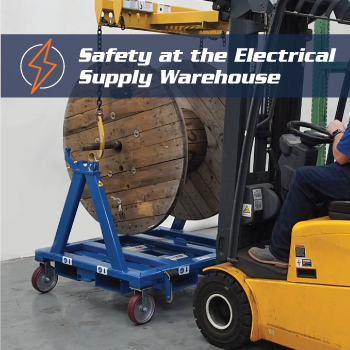We use cookies to make your experience better. To comply with the new e-Privacy directive, we need to ask for your consent to set the cookies. Learn more.
Safety at the Electrical Supply Warehouse

We spend a lot of time discussing electrical safety at the jobsite, in the home, and even in schools. But what about safety programs for the workers who make electrical systems possible?
Long before electricians begin to observe their strict lockout/tagout protocols or double-check the NEC, the electrical-material supply chain is hard at work, manufacturing, storing, shipping, and distributing the goods that build our national electrical infrastructure.
So what does this mean for National Electrical Safety Month? We’d like to take a moment to consider safety in a crucial node of the electrical supply chain: warehouses and distribution centers.
Electrical materials create material-handling challenges not present in other supply chains. Cable must be spooled and unspooled; lengths of conduit must be bundled and cut. The unique demands of the products stored in electrical warehouses demand specific safety procedures, which often overlap, but are not identical, to those found in other warehouses or industrial environments.
Here are a few examples:
Plan your safety training around the materials at hand — and never stop training.
Of course, there are legal requirements for workplace safety training, especially in fields that use heavy material-handling equipment like forklifts. But to really reduce injury rates — or, better yet, eliminate workplace injuries altogether — managers of electrical-material warehouses need to tailor training programs to their particular risks.
For instance, train workers to avoid transporting cable reels by manually rolling them across the floor. While this may seem like a convenient labor-saving move, reels can quickly escape control and injure others on the floor or job site.
Instead, train workers to handle cable reels by mounting them all on Reel Stands for easy access and safe transportation.
Instruct forklift operators on the proper use of attachments designed to handle cable reels.
Like the OSHA sticker says, “It is a violation of Federal law for anyone … who is not properly trained and certified” to operate a forklift.” At electrical supply warehouses, though, forklift operators will need additional training on attachments that allow them to handle specialized materials.
A variety of fork attachments are available for handling fully loaded industrial cable reels, and operators must know which equipment to choose for each operation. Ensure that all users are fully trained on both Overhead Reel Lifters and standard Reel Handler Attachments for safe handling of cable reels during every shift.
Build an ergonomics program around electrical materials.
Ergonomics is an important element of any workplace safety program. Protect workers from musculoskeletal disorders associated with lifting, pulling, and awkward postures by providing a full collection of equipment designed to simplify material handling.
Carts designed specifically for electrical materials can go a long way toward limiting ergonomic hazards. Conduit Carrier Carts, Wire Coil Carts, and Light Fixture Carts can all limit repetitive motions and eliminate heavy lifting.
Occupational safety is a major concern for all warehouse managers, or at least it should be. As supply chain engineer Rajiv Saxena once wrote in the pages of the trade publication Industrial Engineer: IE, “It’s easy to believe that almost every corporate function can be scaled down for greater savings. And many can. However, some business activities defy this rule for one of three reasons: They are that essential; they pay for themselves; or they are the right thing to do.”
“A good warehouse safety program meets all three criteria.”
References:
Saxena, Rajiv. “Don’t Fool around with Safety Programs.” Industrial Engineer: IE, vol. 42, no. 4, Apr. 2010, p. 26. EBSCOhost. 15 Mar. 2019.
“Worker Safety Series: Warehousing.” OSHA. Occupational Safety and Health Administration, U.S. Department of Labor, n.d. PDF. 15 Mar. 2019.
